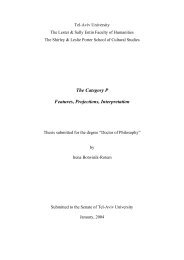Personalized Medicine “It doesn't get more personal than this.â€
Personalized Medicine “It doesn't get more personal than this.â€
Personalized Medicine “It doesn't get more personal than this.â€
You also want an ePaper? Increase the reach of your titles
YUMPU automatically turns print PDFs into web optimized ePapers that Google loves.
medicine<br />
By Ilana Teitelbaum<br />
16<br />
The war on drugs makes headlines,<br />
but it’s the victims of addiction who are<br />
caught in the crossfire, facing a grueling<br />
road to recovery for which there are few<br />
effective treatments. And in cases of<br />
prescription drugs such as Oxycodone<br />
or Ritalin, even patients in a clinical<br />
setting can fall prey to addiction.<br />
At TAU’s Dr. Miriam and Sheldon<br />
G. Adelson Center for the Biology of<br />
Addictive Diseases, scientists are analyzing<br />
– practically molecule by molecule<br />
– the biological processes of addiction.<br />
They are advancing new and unexpected<br />
solutions and finding hidden properties<br />
to addictive drugs that may offer treatments<br />
for various degenerative diseases.<br />
Comprising researchers from a variety<br />
of disciplines, including neurobiology<br />
and psychology, the center is part of<br />
the Sackler Faculty of <strong>Medicine</strong> and is<br />
the first of its kind in Israel.<br />
Taking the pain out of morphine<br />
withdrawal<br />
The capacity of morphine to treat<br />
debilitating pain comes with a serious<br />
downside: it is a highly addictive drug.<br />
Withdrawal produces intense pain, diarrhea<br />
and other symptoms, all of which<br />
make recovery from addiction extremely<br />
traumatic for patients.<br />
Until now there has been no treatment<br />
that could completely and permanently<br />
alleviate the withdrawal<br />
symptoms from morphine addiction.<br />
Thinking<br />
Outside the Box<br />
about Addiction<br />
TAU scientists are researching new<br />
medications and therapies for the<br />
treatment of addictive drugs<br />
Prof. Yosef Sarne, a researcher at the<br />
Adelson Center who is investigating<br />
the properties of morphine, discovered<br />
that a miniscule dose of morphine – less<br />
<strong>than</strong> one thousandth of a normal dose<br />
– causes the same severe pain and diarrhea<br />
that occur during withdrawal from<br />
morphine. Prof. Sarne determined that<br />
the blood of patients undergoing withdrawal<br />
contains these same miniscule<br />
doses of morphine. Because the drug<br />
takes time to leave the body entirely, it<br />
may be these tiny quantities of the drug<br />
Prof. Zvi<br />
Vogel,<br />
Director of<br />
the Adelson<br />
Center<br />
that cause the debilitating withdrawal<br />
symptoms.<br />
Armed with <strong>this</strong> knowledge, Prof.<br />
Sarne is now exploring the possibility<br />
of treating morphine withdrawal<br />
by using naloxone, which prevents the<br />
binding of morphine to opiate receptors<br />
in the brain and thereby neutralizes<br />
the effects of the drug. In patients<br />
undergoing withdrawal, high doses of<br />
naloxone may prevent the painful side<br />
effects caused by small quantities of<br />
residual morphine in the bloodstream,<br />
and ease the road from withdrawal to<br />
recovery.<br />
Developing a non-addictive pain<br />
killer<br />
Researchers around the world are<br />
constantly in search of analgesic drugs<br />
that will treat pain as effectively as<br />
morphine, but without the addiction<br />
and side effects that make morphine<br />
so problematic.<br />
Currently it is known that a small<br />
dose of morphine combined with antidepressant<br />
drugs can amplify the efficacy<br />
of the morphine. Based on <strong>this</strong> principle,

















